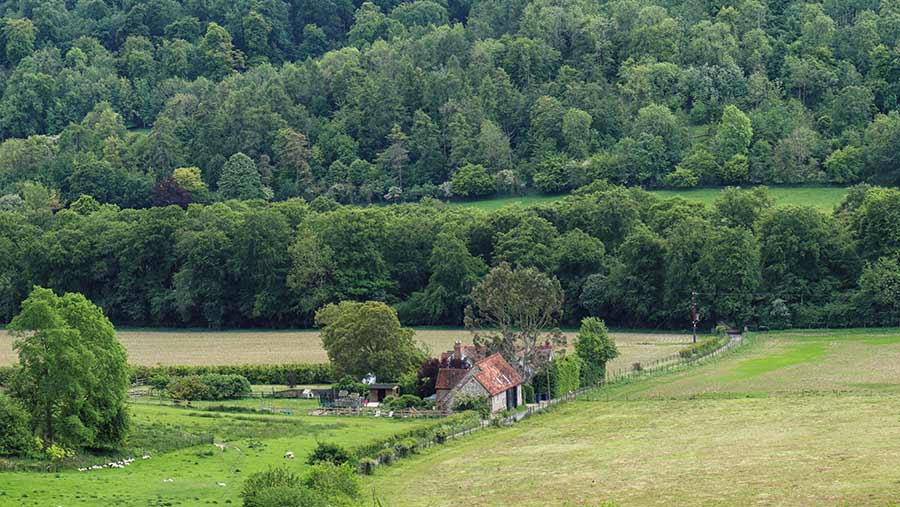Business Clinic: How to navigate woodland market
 © Chris Lofty/Adobe Stock
© Chris Lofty/Adobe Stock Whether you have a legal, tax, insurance, management or land issue, Farmers Weekly’s Business Clinic experts can help.
Here, Marc Liebrecht, head of forestry at Carter Jonas, explains how to tackle the growing woodland market.
See also: Business Clinic: Worried about horse trek across our livestock fields
Q. I’m looking to purchase an area of around five acres of woodland. Prices seem to vary hugely, why is this and what should I be looking out for?
A. I can assure you that you’re not alone – since the beginning of the pandemic, the demand for small parcels of woodlands has soared. Many buyers entering the market are not foresters, but are instead buying woodland for enjoyment and recreation.
This has led to soaring prices as people with disposable income compete for a limited number of woodlands within reasonable travelling distance of their homes.
The price of woodland will vary for a vast number of reasons including location, species mix and accessibility.
The key is finding the piece that suits you and your vision. The hobby buyer is prepared to pay for the right woodland and that also leads to a variation in prices.
There is a lot to think about and I’ll try and give a snapshot of the key considerations here.
My first piece of advice is to establish your objectives. You’ve mentioned that you’re looking for around five acres, so I assume you’re not looking to run a commercial forestry enterprise.
However, consider whether you want something you can enjoy from the get-go with little input, or whether you’re willing to get involved more in the hands-on management.
If it’s the latter, then some skills and know-how is required. You may also wish to use the land to collect firewood or to camp in and so on.
When looking at potential purchases, access will be key, with requirements depending on what you plan to do.
If there is some timber to extract you will need access suitable for large wagons – if you just want to collect firewood, you will just need to get a pickup on site.
If there is no access for vehicles, then you’ll only ever be able to use it for leisure. Access may be by agreement across third-party land, which is not in itself an issue, but make sure that the agreement specifically permits what you plan to do.
If you’re hoping to fell any trees, seek professional advice before purchasing, as you will require permission (subject to some exemptions) and there will be costs for licences and standards to comply with.
In terms of development, you may be able to put in simple infrastructure, like paths or possibly a shed, but getting permission to build a house is very unlikely, as there are tight regulations to protect woodland.
If you’re not hoping to do anything with the land other than use it for peaceful enjoyment, check for public rights of way as this can affect the feeling of privacy.
You may wish to manage this a little by installing signs or fencing to allow people to enjoy use of the waymarked paths without compromising what you want from the woodland.
Many buyers looking to purchase woodland for enjoyment particularly want woodland that is natural and native (the archetypal woodland with a carpet of bluebells or snowdrops) or that can be transformed into semi-natural ancient woodland.
If this is your goal, I suggest finding out what ancient woodland typically looks like in your area – it may include a mix of some of the following broadleaf species: oak, beech, birch, hazel, hawthorn, holly and ash.
And, with the proliferation of ash dieback, it is important to find out the proportion of this species.
If it’s not affected already, there is a large risk of it being so in the future. As such, woodland with lots of ash will require substantial work.
On a more positive note, there is a lot of support available for woodland management.
This includes grant funding, albeit for larger parcels than you’re considering. The Forestry Commission is the best first port of call for further information on this.
Finally, go for a good walk around and inspect the land as you would a house – and consider getting advice from a professional.
Once you’re in, don’t rush into making any changes but live with it for a year or so and get to know it first.
Good luck with your purchase.
Do you have a question for the panel?
Outline your legal, tax, finance, insurance or farm management question in no more than 350 words and Farmers Weekly will put it to a member of the panel. Please give as much information as possible.
Email your question to FW-Businessclinic@markallengroup.com using the subject line “Business Clinic”.
